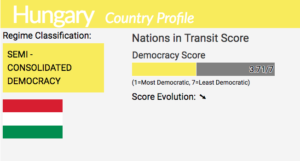 A change in control at Budapest’s 1956 Institute, prompted by Hungary’s illiberal premier Viktor Orban, is part of a wider trend of stifling academic freedom and limiting public dissent, creating a narrative that portrays Hungary as a 20th century victim of the Nazis and the Soviets, The FT’s Valerie Hopkins writes:
A change in control at Budapest’s 1956 Institute, prompted by Hungary’s illiberal premier Viktor Orban, is part of a wider trend of stifling academic freedom and limiting public dissent, creating a narrative that portrays Hungary as a 20th century victim of the Nazis and the Soviets, The FT’s Valerie Hopkins writes:
The controversy over the 1956 Institute is in line with a vision Mr Orban spelt out last summer. Speaking at a summer festival in Transylvania, organised by his party and its local partners, Mr Orban said his victory in elections that year which brought him a fourth term as premier had given his administration “nothing short of a mandate to build a new era”. “An era is a special and characteristic cultural reality . . . a spiritual order, a kind of prevailing mood, perhaps even taste — a form of attitude . . . determined by cultural trends, collective beliefs and social customs,” he said. “This is now the task we are faced with: we must embed the political system in a cultural era.”
 “They are trying to sell the idea that there is only one hero in the change of the regime — that [Mr Orban] single-handedly defeated communism and cut the iron curtain,” says Gabor Egry, director of the Budapest-based Institute of Political History. Adding that their version “is a very simple story, taken out of international context”.
“They are trying to sell the idea that there is only one hero in the change of the regime — that [Mr Orban] single-handedly defeated communism and cut the iron curtain,” says Gabor Egry, director of the Budapest-based Institute of Political History. Adding that their version “is a very simple story, taken out of international context”.
Orban’s push to create institutions that forge a new national grand narrative about the past have been aimed at reinforcing a sense of collective victimhood, says Gergely Romsics, a historian and lecturer at Budapest’s ELTE university and a senior research fellow at the Hungarian Academy of Sciences.
“This would legitimise a defiant stance towards western institutions on the one hand, and foster a national community on the basis of all groups having suffered at some point in history,” he says, alluding to Mr Orban’s regular clashes with Brussels in recent years. RTWT

Wikipedia
Orban is a tyrant, not a populist, said the Hungarian philosopher Ágnes Heller. In a moving obituary in the Frankfurter Allgemeine, Jürgen Habermas compared Heller, who was forced to flee anti-Semitic totalitarianism for the US, to the heirs of German idealism, adds Eurozine (a partner of the National Endowment for Democracy):
In a 2009 contribution to the sadly now inactive Hungarian Quarterly, Heller wrote of her abiding joy since 1989: ‘Those who have directly known servitude and oppression, and for whom freedom is the greatest value and gift, have not ceased rejoicing to this day. Regime change, as far as I was concerned, was a miracle that one hoped for but did not expect to see, and a miracle it has remained.’







